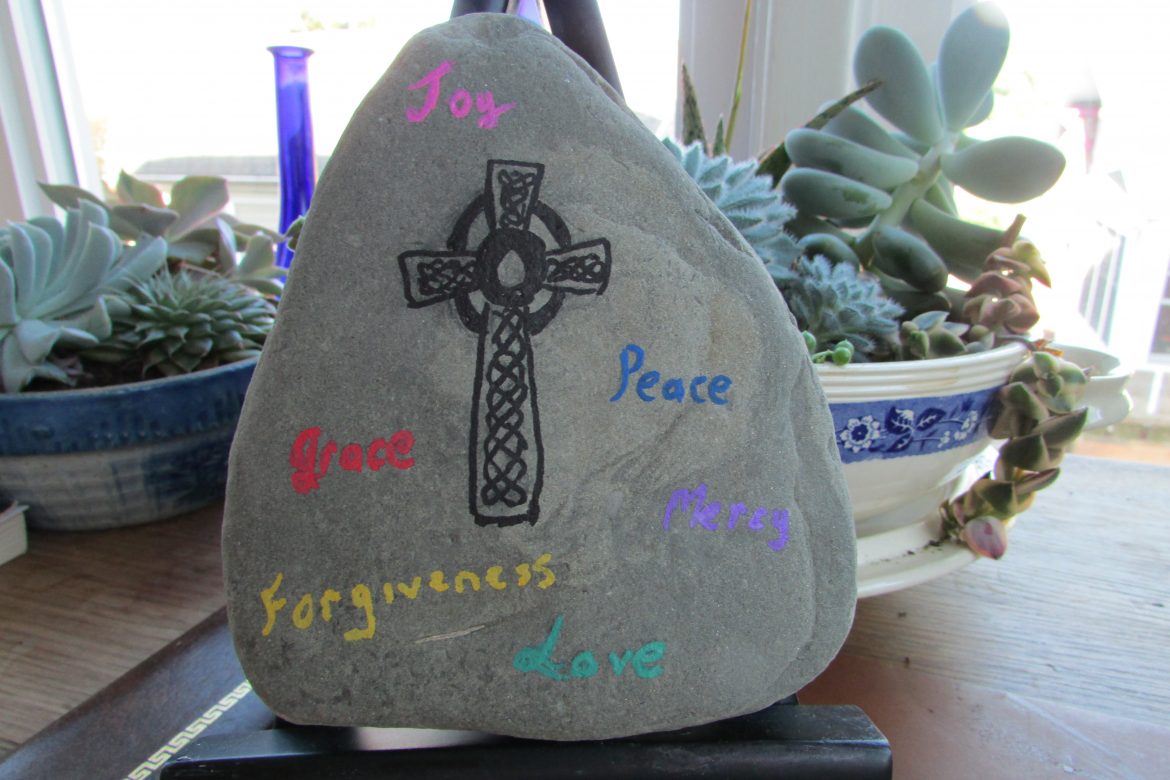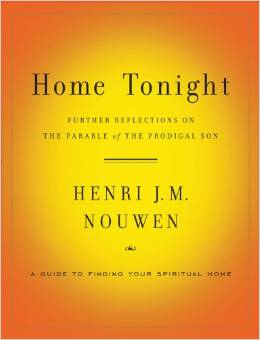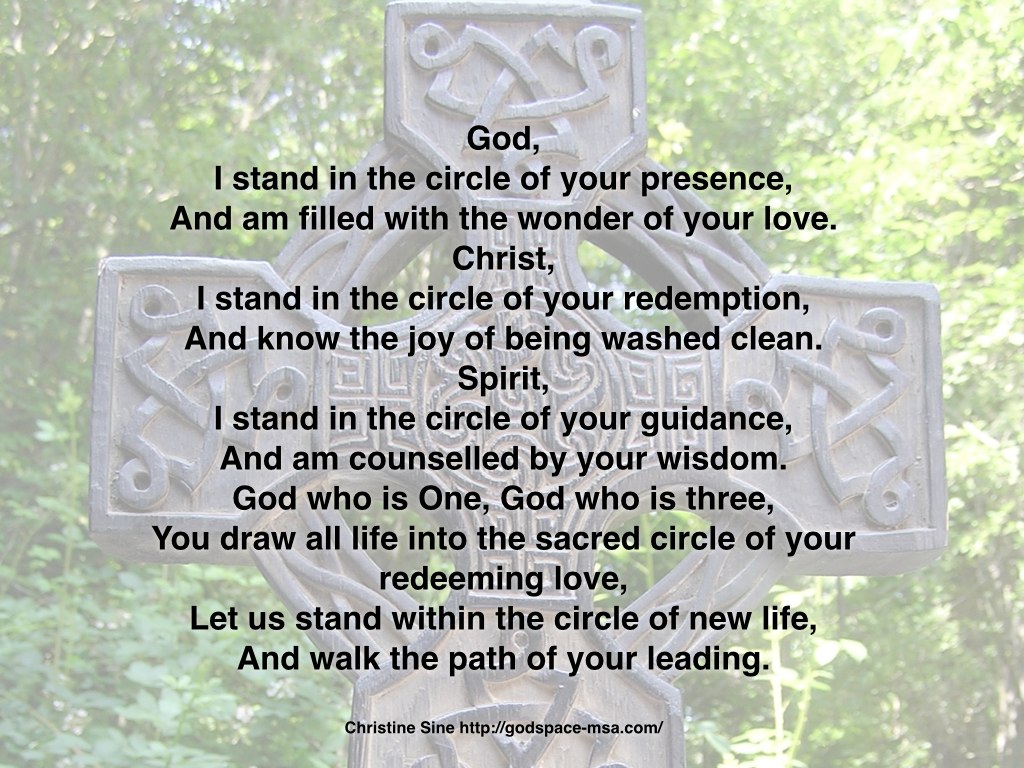I think that the title of this post says it all. It’s time to dance and sing and clap your hands. Together we have done it! I just wanted to extend a big thank you for those of you who contributed to our kickstarter campaign. Our target was $5,000 and we raised $5,300. Hopefully we will be able to launch our e-course based on my book Return to Our Senses in November. We will keep you updated. Prayers appreciated as we move forward with this.
by Christine Sine
Tom and I have just returned from a trip to Mayne Island B.C. and my head is buzzing with all that I have reflected on and learned during my time away. It was a rich and fulfilling time and over the next few days I plan to share some of my reflections with you.
This year to aid my contemplation I decided to do some rock painting. Specifically I decided to paint some Celtic patterns that would focus my prayers and my thoughts. This is a creative exercise that we often offer to attendees at our Celtic retreat, but because of my involvement in the retreat programme, I rarely have time to participate.
The exercise proved to be far more powerful than I had expected. I started with the simple Celtic symbol above, drawn from one of our books on Celtic art. Then I decided to get more adventurous and paint a Celtic cross – not an easy exercise but one that I thoroughly enjoyed. The cross now sits on my desk and I continue to reflect on it and all that God is teaching me through it.
During our time away I started to add words that reflect what the cross of Christ means to me. I started with love, joy, peace and grace, but this morning added mercy, and forgiveness. I suspect that in the next few days more words will be added reflecting what the cross of Christ has meant to me.
My cross is nowhere near perfect, but as I gazed at it this morning I realized how fitting that was. After all my view of the cross, its power, its pain and its beauty is nowhere near perfect either. I keep discovering new depths of meaning and purpose in it. I keep unveiling new ways in which I need to bow before it and absorb its messages for my life and for the world in which I live.
I think that by the time I am done this stone will be crowded with words and resounding with meaning and memories. It is an exercise I would heartily recommend to you and don’t worry if the result isn’t perfect. God probably wants to keep working in your life too.
Tom and I have just returned home from a wonderful time of rest and relaxation on Mayne Island B.C. Both of us are returning feeling refreshed and renewed and more aware than ever of the incredible privilege of our lives. So many in our world are held captive by violence, disease and despair. Others are bound by resentment and anger, imprisoned not by physical walls but by their own refusal to enjoy life as it is.
While we were away, I have been reading Home Tonight: Further Reflections on the Parable of the Prodigal Son by Henri Nouwen. Like his Return of the Prodigal Son, this book revolves around Nouwen’s reflections on Rembrandt’s painting The Return of the Prodigal Son, but this one has more to say about the older son than the younger, more to say about resentment than dissipation.
Resentment, the curse of the faithful, the virtuous, the obedient, and the hardworking, settles itself in the human heart and causes havoc. That is why it’s important to think and reflect upon it. All of us who give our lives for loved ones, work hard, and objectively have many virtues to be praised, are sometimes not really free from the burden of resentment in our hearts. (59).
Nouwen goes on to say:
So the one in the story who in many respects did the objectively good thing, the person who was praised as the “good son” as compared with the “bad one”, the one who stayed home, worked hard, was obedient to the old father, and was faithful, ended up being as lost spiritually as the younger guy who ran off and dissipated his inheritance. But the elder was lost in a very different and complex way. Unlike the dissipation of the younger, the elder was far away from home emotionally because of resentment. (61).
How many of us never feel we belong in the family of God because of resentments that eat at our hearts? How often do we refuse to come home into the intimate love of God because we will not let go of our resentments and the anger they engender? How often do we react as the elder son did:
He was angry then and refused to go in, and his father came out and began to urge him to come in; but he retorted to his father, “All these years I have slaved for you and never once disobeyed your orders, yet you never once offered me so much as a kid for me to celebrate with my friends.”
I can think of a number of resentments that have held me captive over my lifetime and I have spent the last few days thinking about them and letting go, I hope, of the last vestiges of their bondage in my life. Naming those resentments and reliving their burden, now with the knowledge that I am indeed a beloved child of God has been very liberating for me. Placing myself inside rather than outside the circle of God’s love and kinship has totally changed my perspective on so much of what I do and who I am. Above all it has made it possible for me to celebrate and join in God’s joy at the return of so many prodigals I have known.
Slave or child of the living God, it is often a matter of perspective. I can deliberately and resentfully stand outside the circle of God’s loving embrace and refuse to recognize who I am and even more tragically who God is. Resentment builds because I think God is a hard taskmaster whose authoritarian orders must be obeyed… without any expectation of remuneration. Sadly in this frame of mind I can refuse to accept the freely given gifts of a generous God who longs to draw us into the eternal family.
So many of the privileges of my life are only shared by a small percentage of our world’s population. Few in our world will ever live, like I do, a life without hunger, health, housing or economic hardship. But there is one privilege that is open to all of us, the wonder of being embraced by the God of love, who longs to welcome home all who have strayed from a knowledge of our inclusion in the divine family.
So my question for all of us today is: Where does the resentment of the elder son still hold you bound? What do you need to do to release those resentments and recognize yourself once more as a beloved child of God?
Let us affirm today,
that we are made in the image of the eternal one.
Loving, compassionate, generous,
Co-creators with the holy one.
Collaborators with the maker of all things.
Let us affirm today,
That we are sons and daughters of the faithful one.
Brothers and sisters of the saving one,
Beloved children of the infilling one.
Let us affirm today,
That God fills us,
God empowers us,
God sustains us.
Without God nothing has purpose.
We belong to God.
— Andy Wade —
 Our kickstarter campaign ends Wednesday, 7:19 AM, PDT and we’re down to the final $585! Here’s where your contribution, no matter the amount, can really make a difference.
Our kickstarter campaign ends Wednesday, 7:19 AM, PDT and we’re down to the final $585! Here’s where your contribution, no matter the amount, can really make a difference.
Even if you’ve already given, you can still click on the link and “Manage Your Pledge” to increase your amount by $5, $10, or whatever you want!
I’m so excited about this new direction I just upped my donation to help us meet this goal.
I know, I work for Mustard Seed Associates so I have a personal interest in the kickstarter’s success. But it’s more than that. Over the years I’ve been inspired and nurtured by Christine and Tom’s writings. They have challenged me in areas I needed to be challenged, and encouraged and comforted me in times where that’s what I needed. Encountering these important resources in a new way and on a deeper level is an exciting prospect!
We are also expanding our resources and moving into new areas with new authors and areas of expertise. We want to make sure all of these tools are available in a variety of ways to meet the needs of those who want to use them.
With “associates” spread out across the globe, we’re also keenly aware of those who aren’t able to attend one of our workshops or retreats in the Pacific Northwest, and many churches and organizations don’t have the resources to have us visit. Online access is a wonderful alternative!
 So please, contribute today. Give a little, give a lot, or up the ante! Your mustard seeds will be planted in fertile soil and well tended for a bountiful harvest!
So please, contribute today. Give a little, give a lot, or up the ante! Your mustard seeds will be planted in fertile soil and well tended for a bountiful harvest!
Andy Wade is a staff writer and web & communications guy at Mustard Seed Associates. He is an ordained in the Mennonite Church, having pastored in the Seattle area and in Hong Kong, where he and his wife, Susan, served with Mennonite Mission Network for 12 years.
Today’s post is by Lynne Baab who is a regular contributor to Godspace. Lynne M. Baab is the author of numerous books on spiritual practices. This post is adapted from her latest book, The Power of Listening: Building Skills for Mission and Ministry. Visit Lynne’s website and blog for information about her books and articles she’s written:
I used to have a joke that expressed my longing to hear God’s voice clearly. When I wanted to know what to do in a specific situation, I used to say I wished that God would hire a cute little plane to sky-write guidance for me.
On the one hand, it’s great to long to hear God’s voice. But on the other hand, I now see it as a bit lazy to long for God to sky-write. Here are some thoughts about why:
Throughout the centuries, Christians have heard God’s voice in a variety of ways, and many Christians have written down their experiences and advice about hearing God. On the one hand, they talk about God’s voice or a sense of God’s nudging coming in surprising, unexpected moments during daily life. And on the other hand, they talk about God’s voice or God’s nudging coming in the midst of consistent spiritual practices that make space to hear that voice.
We must always affirm that nothing we can do can make God speak to us; God’s voice to us through the Holy Spirit is wildly free and beautifully unexpected. However we can adopt a posture of listening that makes it more likely we will hear God when God speaks. And that posture of listening requires intentional effort, even discipline. What are some of the spiritual practices people through the ages have talked about in connection with hearing God’s voice?
1. Reading, studying, praying and meditating on the Bible, both alone and in company with others. The Bible is called “God’s Word” for a reason. All engagement with the Bible is good, but many of us come out of traditions that primarily emphasize engaging the mind. Many of us need to grow in engaging the heart and slowing down so we can hear God’s voice through scripture. Two prayer practices that engage both mind and heart are lectio divina and praying the Psalms and other prayers in the Bible.
2. Praying in many different ways, both alone and in company with others. All forms of prayer can help us hear God’s voice. Silence in prayer is indispensible for helping us learn to listen. Prayer practices like walking the labyrinthor praying while walking outdoors can help us engage our bodies as well as our minds and hearts .
3. Fasting, both alone and in company with others. Throughout most of Christian history, and in Africa, Asia and South and Central American today, Christians expect to hear God’s voice when they fast. People who have a history of eating disorders should not fast from food in any form, and today fasting can involve stopping media, electronic devices, music, shopping, and many other aspects of daily life, as well as stopping eating all food or certain food items. I have heard dozens of stories about how God has spoken during a fast.
4. Hospitality. I can remember the first time I heard that Mother Teresa expected to meet Christ as she encountered people in need. I remember being stunned at that idea. Since then I’ve read many times about the ways Christ is present in friend and stranger in hospitality settings, and God can speak to us powerfully there.
5. Spiritual Direction. The purpose of spiritual direction is to take time in the company of a guide, the spiritual director, to examine our lives and discern God’s presence and God’s guidance.
My skywriting wishes, at their worst, reflect a desire not to have to do any patterns of consistent discipline in order to slow down and make space to hear God’s voice. Saints through the ages tell us that we hear God’s voice unexpectedly as we go about our lives, but that we also grow in ability to hear God’s voice as we make space to listen by engaging in spiritual practices that require consistent effort.
This morning I am posting a beautiful poem by the 13th century Mewlana Jalaluddin Rumi.
I was made aware of this prayer by Cherry Hairston Program Director at The Center at St. Andrew’s. She told me:
I use it, as do some of my colleagues, in teaching the Welcoming Prayer. One way to look at the Welcoming prayer is as a practice of radical spiritual hospitality that welcomes all guests, even the unwanted ones. I love the practice and find it very powerful.
It is a beautiful prayer to meditate on – enjoy
This being human is a guest house
Every morning a new arrival.
A joy, a depression, a meanness,
some momentary awareness comes
as an unexpected visitor.
Welcome and entertain them all
even if they are a crowd of sorrows,
who violently sweep your house
empty of its furniture.
Still treat each guest honorably.
S/he may be cleaning you out for some new delight.
The dark thought, the shame, the malice,
meet them at the door laughing and invite them in.
Be grateful for whoever comes
because each has been sent
as a guide from beyond.
~ Rumi
As an Amazon Associate, I receive a small amount for purchases made through appropriate links.
Thank you for supporting Godspace in this way.
When referencing or quoting Godspace Light, please be sure to include the Author (Christine Sine unless otherwise noted), the Title of the article or resource, the Source link where appropriate, and ©Godspacelight.com. Thank you!








